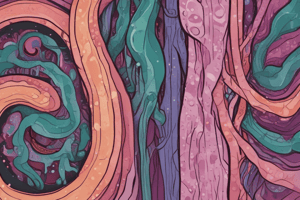Podcast
Questions and Answers
What is the primary effect of Crohn disease on the intestinal wall?
What is the primary effect of Crohn disease on the intestinal wall?
- It causes transmural inflammation, affecting all layers of the GI tract. (correct)
- It affects only the mucosal layer of the colon.
- It exclusively affects the rectum and sigmoid colon.
- It leads to continuous inflammation along the colon without any patches.
What symptoms are most commonly associated with ulcerative colitis?
What symptoms are most commonly associated with ulcerative colitis?
- Fibrotic strictures
- Pointed mucosal hemorrhages and crypt abscesses (correct)
- Fistulas and micropermutations
- Patches of healthy and diseased tissue
In which area does the inflammatory process of ulcerative colitis typically begin?
In which area does the inflammatory process of ulcerative colitis typically begin?
- Proximal colon
- Rectosigmoid area (correct)
- Ileocecal junction
- Terminal ileum
Which of the following is a potential complication of Crohn disease?
Which of the following is a potential complication of Crohn disease?
What role do inflammatory mediators like prostaglandins play in ulcerative colitis?
What role do inflammatory mediators like prostaglandins play in ulcerative colitis?
What describes the appearance of the mucosa during chronic inflammation in ulcerative colitis?
What describes the appearance of the mucosa during chronic inflammation in ulcerative colitis?
Which of the following can cause the mucosa to bleed easily in ulcerative colitis?
Which of the following can cause the mucosa to bleed easily in ulcerative colitis?
What is a common incidence range for Crohn disease in North America?
What is a common incidence range for Crohn disease in North America?
What characterizes the lesions in Crohn's disease compared to those in ulcerative colitis?
What characterizes the lesions in Crohn's disease compared to those in ulcerative colitis?
Which symptom is least likely to be associated with Crohn's disease?
Which symptom is least likely to be associated with Crohn's disease?
What effect does Crohn's disease have on nutrient absorption?
What effect does Crohn's disease have on nutrient absorption?
What is a common complication of Crohn's disease?
What is a common complication of Crohn's disease?
At what ages is the onset of Crohn's disease most commonly observed?
At what ages is the onset of Crohn's disease most commonly observed?
Which of the following factors is associated with an increased risk of developing Crohn's disease?
Which of the following factors is associated with an increased risk of developing Crohn's disease?
What typically happens to the bowel wall as Crohn's disease progresses?
What typically happens to the bowel wall as Crohn's disease progresses?
Which population is known to have a higher rate of Crohn's disease?
Which population is known to have a higher rate of Crohn's disease?
Which aspect of Crohn's disease can contribute to abdominal distention?
Which aspect of Crohn's disease can contribute to abdominal distention?
What is the role of genetic factors in Crohn's disease?
What is the role of genetic factors in Crohn's disease?
Flashcards are hidden until you start studying
Study Notes
Inflammatory Bowel Disease
- IBD is an umbrella term for two chronic inflammatory conditions: Ulcerative Colitis (UC) and Crohn's disease.
- UC affects the mucosa layer of the colon and rectum, causing inflammation and ulceration.
- Crohn's disease can affect any part of the GI tract, but commonly affects the terminal ileum and proximal colon, causing transmural inflammation and potential complications like strictures, fistulas, and micropermutations.
Ulcerative Colitis
- UC inflammation begins at the rectosigmoid area and progresses proximally.
- Chronic inflammation can cause atrophy, narrowing, and shortening of the colon.
- Pseudopolyps can form as the epithelial lining regenerates.
Crohn's Disease
- Crohn's disease typically begins as a small inflammatory aphthoid lesion.
- The inflammatory process can involve the entire intestinal wall, leading to a cobblestone appearance.
- Lesions are often skip lesions, affecting the entire bowel.
- Fibrotic changes cause the bowel wall to thicken and lose flexibility, leading to obstruction, abscesses, and fistulas.
Etiology of Inflammatory Bowel Disease
- The etiology of both UC and Crohn's disease is unknown.
- Genetic and environmental factors, potential infectious agents, and altered immune responses may play a role.
- Autoimmunity and lifestyle factors, like smoking, may affect development.
Risk Factors
- The onset of IBD typically occurs between 15 and 30 years of age, with a possible second peak between 50 and 80.
- Higher rates observed in white populations, particularly American Jews of European descent.
- Rates are increasing in Black and Hispanic populations in urban areas.
- Smoking increases the risk of Crohn's disease.
- Lack of physical activity increases the risk of Crohn's disease.
- High-fiber diets may lower the risk of Crohn's disease.
- Previous antibiotic use increases the risk of Crohn's disease.
Prevention
- No specific prevention recommendations for IBD.
- A healthy lifestyle with physical activity, adequate sleep, and a healthy diet is generally beneficial.
Studying That Suits You
Use AI to generate personalized quizzes and flashcards to suit your learning preferences.




